Is same-sex marriage inevitable?
As Yogi Berra famously said, "It ain't over until it's over"


A free daily email with the biggest news stories of the day – and the best features from TheWeek.com
You are now subscribed
Your newsletter sign-up was successful
The U.S. Supreme Court will hear two cases this week related to gay marriage. And while most legal observers think it's unlikely that the court will make a broad constitutional ruling legalizing same-sex marriage across the country, even a narrow ruling could give the movement toward marriage equality a new boost.
In fact, the march toward legalizing same sex marriage in the United States sometimes seems unstoppable.
A new Washington Post poll shows that 58 percent of Americans now support gay marriage. Among those 18 to 29 years old, the number is a whopping 81 percent.
The Week
Escape your echo chamber. Get the facts behind the news, plus analysis from multiple perspectives.

Sign up for The Week's Free Newsletters
From our morning news briefing to a weekly Good News Newsletter, get the best of The Week delivered directly to your inbox.
From our morning news briefing to a weekly Good News Newsletter, get the best of The Week delivered directly to your inbox.
This is a stunning reversal from the 2004 presidential election, when gay marriage was used as a wedge issue by Republicans to re-elect George W. Bush. Karl Rove, Bush's campaign manager and the architect of using gay marriage as a wedge issue, now says it's conceivable the GOP nominee in 2016 could support it.
A new Pew Research survey finds that the rise in support for same-sex marriage over the past decade "is among the largest changes in opinion on any policy issue over this time period."
But supporters should take nothing for granted. One need only look to the Equal Rights Amendment for an example of a social movement that once seemed unstoppable but stalled on its way to becoming law.
Matthew Cooper points out that as with same-sex marriage, "the most important battleground for the ERA took place in state legislatures. The ERA seemed to have unstoppable momentum when it came out of Congress with the necessary two-thirds majority in both the House and the Senate."
A free daily email with the biggest news stories of the day – and the best features from TheWeek.com
But even though 30 states had passed the ERA by the end of 1973, it could never get to the 38 states necessary to amend the Constitution. Efforts to resuscitate the ERA since then have all failed.
Supporters of same-sex marriage must take heed of Yogi Berra's famous saying, "It ain't over, until it's over."
Taegan D. Goddard is the founder of Political Wire, one of the earliest and most influential political websites. He also runs Wonk Wire and the Political Dictionary. Goddard spent more than a decade as managing director and COO of a prominent investment firm in New York City. Previously, he was a policy adviser to a U.S. senator and governor. Goddard is also co-author of You Won — Now What? (Scribner, 1998), a political management book hailed by prominent journalists and politicians from both parties. Goddard's essays on politics and public policy have appeared in dozens of newspapers across the country, including The Washington Post, USA Today, Boston Globe, San Francisco Chronicle, Chicago Tribune, Philadelphia Inquirer, and Christian Science Monitor. Goddard earned degrees from Vassar College and Harvard University. He lives in New York with his wife and three sons.
-
 Switzerland could vote to cap its population
Switzerland could vote to cap its populationUnder the Radar Swiss People’s Party proposes referendum on radical anti-immigration measure to limit residents to 10 million
-
 Political cartoons for February 15
Political cartoons for February 15Cartoons Sunday's political cartoons include political ventriloquism, Europe in the middle, and more
-
 The broken water companies failing England and Wales
The broken water companies failing England and WalesExplainer With rising bills, deteriorating river health and a lack of investment, regulators face an uphill battle to stabilise the industry
-
 The billionaires’ wealth tax: a catastrophe for California?
The billionaires’ wealth tax: a catastrophe for California?Talking Point Peter Thiel and Larry Page preparing to change state residency
-
 Bari Weiss’ ‘60 Minutes’ scandal is about more than one report
Bari Weiss’ ‘60 Minutes’ scandal is about more than one reportIN THE SPOTLIGHT By blocking an approved segment on a controversial prison holding US deportees in El Salvador, the editor-in-chief of CBS News has become the main story
-
 Has Zohran Mamdani shown the Democrats how to win again?
Has Zohran Mamdani shown the Democrats how to win again?Today’s Big Question New York City mayoral election touted as victory for left-wing populists but moderate centrist wins elsewhere present more complex path for Democratic Party
-
 Millions turn out for anti-Trump ‘No Kings’ rallies
Millions turn out for anti-Trump ‘No Kings’ ralliesSpeed Read An estimated 7 million people participated, 2 million more than at the first ‘No Kings’ protest in June
-
 Ghislaine Maxwell: angling for a Trump pardon
Ghislaine Maxwell: angling for a Trump pardonTalking Point Convicted sex trafficker's testimony could shed new light on president's links to Jeffrey Epstein
-
 The last words and final moments of 40 presidents
The last words and final moments of 40 presidentsThe Explainer Some are eloquent quotes worthy of the holders of the highest office in the nation, and others... aren't
-
 The JFK files: the truth at last?
The JFK files: the truth at last?In The Spotlight More than 64,000 previously classified documents relating the 1963 assassination of John F. Kennedy have been released by the Trump administration
-
 'Seriously, not literally': how should the world take Donald Trump?
'Seriously, not literally': how should the world take Donald Trump?Today's big question White House rhetoric and reality look likely to become increasingly blurred
